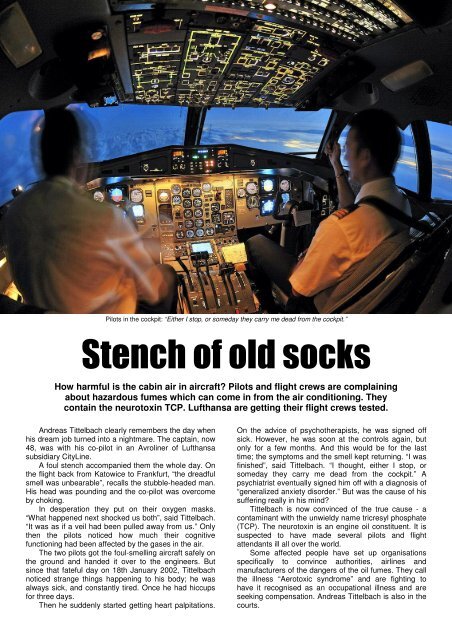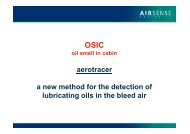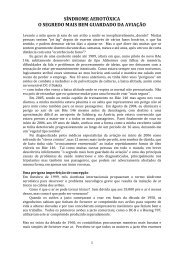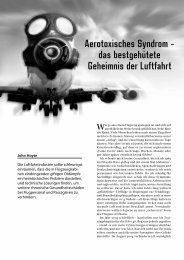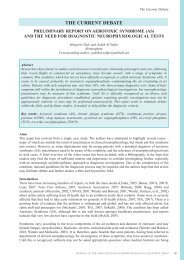Der Spiegel: Stench of old socks - Aerotoxic Association
Der Spiegel: Stench of old socks - Aerotoxic Association
Der Spiegel: Stench of old socks - Aerotoxic Association
Create successful ePaper yourself
Turn your PDF publications into a flip-book with our unique Google optimized e-Paper software.
Pilots in the cockpit: “Either I stop, or someday they carry me dead from the cockpit.”<br />
<strong>Stench</strong> <strong>of</strong> <strong>old</strong> <strong>socks</strong><br />
How harmful is the cabin air in aircraft? Pilots and flight crews are complaining<br />
about hazardous fumes which can come in from the air conditioning. They<br />
contain the neurotoxin TCP. Lufthansa are getting their flight crews tested.<br />
Andreas Tittelbach clearly remembers the day when<br />
his dream job turned into a nightmare. The captain, now<br />
48, was with his co-pilot in an Avroliner <strong>of</strong> Lufthansa<br />
subsidiary CityLine.<br />
A foul stench accompanied them the whole day. On<br />
the flight back from Katowice to Frankfurt, “the dreadful<br />
smell was unbearable”, recalls the stubble-headed man.<br />
His head was pounding and the co-pilot was overcome<br />
by choking.<br />
In desperation they put on their oxygen masks.<br />
“What happened next shocked us both”, said Tittelbach.<br />
“It was as if a veil had been pulled away from us.” Only<br />
then the pilots noticed how much their cognitive<br />
functioning had been affected by the gases in the air.<br />
The two pilots got the foul-smelling aircraft safely on<br />
the ground and handed it over to the engineers. But<br />
since that fateful day on 18th January 2002, Tittelbach<br />
noticed strange things happening to his body; he was<br />
always sick, and constantly tired. Once he had hiccups<br />
for three days.<br />
Then he suddenly started getting heart palpitations.<br />
On the advice <strong>of</strong> psychotherapists, he was signed <strong>of</strong>f<br />
sick. However, he was soon at the controls again, but<br />
only for a few months. And this would be for the last<br />
time; the symptoms and the smell kept returning. “I was<br />
finished”, said Tittelbach. “I thought, either I stop, or<br />
someday they carry me dead from the cockpit.” A<br />
psychiatrist eventually signed him <strong>of</strong>f with a diagnosis <strong>of</strong><br />
“generalized anxiety disorder.” But was the cause <strong>of</strong> his<br />
suffering really in his mind?<br />
Tittelbach is now convinced <strong>of</strong> the true cause - a<br />
contaminant with the unwieldy name tricresyl phosphate<br />
(TCP). The neurotoxin is an engine oil constituent. It is<br />
suspected to have made several pilots and flight<br />
attendants ill all over the world.<br />
Some affected people have set up organisations<br />
specifically to convince authorities, airlines and<br />
manufacturers <strong>of</strong> the dangers <strong>of</strong> the oil fumes. They call<br />
the illness “<strong>Aerotoxic</strong> syndrome” and are fighting to<br />
have it recognised as an occupational illness and are<br />
seeking compensation. Andreas Tittelbach is also in the<br />
courts.
1 C<strong>old</strong> air flows into the engine. In the compressor 2 The hot air is bled <strong>of</strong>f from the compressor 3 There the bleed air is mixed with cooler<br />
it is compressed and thereby heated. and fed into the air conditioning system. air from the air conditioning and<br />
directed into the cockpit and cabin.<br />
But the aircraft manufacturers don’t want to stop<br />
putting TCP in turbine oil. The organophosphate was<br />
long regarded a marvel <strong>of</strong> the petrochemical industry. It<br />
is stable at high temperatures - an ideal lubricant for<br />
engine shafts - onto which compressor blades are<br />
attached that compress the airflow into the combustion<br />
chamber.<br />
But what hardly any passengers would guess is that<br />
between the TCP-containing oil and the air they breathe<br />
in the cabin, there is only a seal which separates the<br />
compressor bearings and a component that distributes<br />
a portion <strong>of</strong> the compressed air to the cabin. The socalled<br />
bleed air supplies passengers on board with vital<br />
oxygen in every one <strong>of</strong> the 14,000 or so modern jet<br />
aircraft all over the world (see diagram).<br />
The extraction <strong>of</strong> bleed air from the engines carries<br />
a risk. The seals may leak, particularly during take <strong>of</strong>f<br />
and landing, whereby hot oil vapour is released into the<br />
air. “You get a really nasty stench <strong>of</strong> <strong>old</strong> <strong>socks</strong>, as I so<br />
<strong>of</strong>ten had to breathe in”, explains ex-captain Tittelbach.<br />
But how dangerous is it really? If you believe the<br />
protestations <strong>of</strong> the aviation industry, then the odours<br />
are barely worse than what fellow travellers give <strong>of</strong>f.<br />
The aircraft manufacturer Airbus maintains that the<br />
debate is as unimportant as discussion about the<br />
dangers <strong>of</strong> cosmic radiation.<br />
Critics argue that TCP is not only dangerous to the<br />
health <strong>of</strong> passengers and crew. “Pilots’ cognitive<br />
function can be affected without them realising and it<br />
could lead to accidents”, warns Jörg Handwerg from the<br />
pilot union “Cockpit”. He is calling for an independent<br />
scientific study on the health effects <strong>of</strong> oil fumes.<br />
Doctors share his concern. “It has been known for a<br />
long time that TCP is an extremely toxic chemical”, says<br />
Dietrich Henschler. The retired pharmacologist from<br />
Würzburg is amazed that the aerospace industry has so<br />
persistently ignored the problem.<br />
Henschler is not just anyone. It was his studies in<br />
the 1950s that first identified the neurotoxic potential <strong>of</strong><br />
TCP. Henschler says, “The human body is particularly<br />
sensitive to it. Even in small amounts it destroys certain<br />
neural pathways.”<br />
Clement Furlong, a biochemist at the University <strong>of</strong><br />
Washington in Seattle has developed a new method for<br />
detection <strong>of</strong> TCP in the blood. He also warns <strong>of</strong><br />
potential adverse health effects. He says, “It's crazy that<br />
airplanes still use bleed air.”<br />
Manufacturers, airlines and authorities point out that<br />
scientific pro<strong>of</strong> <strong>of</strong> a link between symptoms and the<br />
toxin has so far not been established. But it can hardly<br />
be disputed that oil vapour gets into the cabin. Some<br />
aircraft such as the Avroliner and Boeing 757 are<br />
particularly susceptible. However, Airbus aircraft are<br />
also affected by the design flaws.<br />
In summer 2009, a German Wings A319 had oil<br />
smells coming out <strong>of</strong> the air conditioning. A witness said<br />
that one <strong>of</strong> the flight attendants almost collapsed<br />
against his car after work. German Wings states that the<br />
short-range jet was inspected immediately and that no<br />
defects were found. Pilots contradict this and say the<br />
plane was still flying two weeks later and still stinking.<br />
Last year it even affected the prestigious Airbus<br />
aircraft, the enormous A380. On a Lufthansa flight from<br />
Frankfurt to Tokyo on 14 September 2010, the<br />
unpleasant smell was coming from the air conditioning.<br />
Methodically the pilots switched <strong>of</strong>f the bleed air supply<br />
from each <strong>of</strong> the four engines, one by one. They<br />
identified the faulty unit. “We have since replaced the<br />
engine”, confirmed Lufthansa spokesman Michael<br />
Lamberty.<br />
There were dramatic scenes in January last year in<br />
the USA on a U.S. Airways Boeing 767. After landing in<br />
Charlotte (North Carolina), the two pilots and 13<br />
passengers and crew members had to be carried <strong>of</strong>f the<br />
aircraft on stretchers.<br />
According to new unpublished findings, oil fumes in<br />
the cabin are more common than previously thought. At<br />
any rate this is what figures from the German Air<br />
Accidents Investigation Branch (BFU) show. These<br />
events have been very carefully analysed since last<br />
year. According to the figures, 60 oil fume events were<br />
reported in 2010 by just one German airline. “However,<br />
the estimated number <strong>of</strong> unreported cases could be<br />
higher”, says BFU spokesman Karsten Severin.
Some airlines reported remarkably few incidents.<br />
But Severin <strong>of</strong>ten gets the message directly from pilots<br />
that they “obviously distrust their employer.” The BFU in<br />
Brunswick therefore assumes one incident per day.<br />
The aviation industry doesn’t have much interest in<br />
researching the TCP problem. There are a number <strong>of</strong><br />
clues that give rise to caution. Back in 1930 the<br />
potential TCP has as a nerve poison was proved.<br />
During the Prohibition more than 20,000 Americans<br />
suffered paralysis after they drank an alcohol mixture<br />
contaminated with TCP.<br />
Early on toxicologists had deciphered the effects <strong>of</strong><br />
this substance. Processes in the body can transform<br />
chemicals into compounds that interfere with nerve cell<br />
communication and can lead to cell death. Biochemist<br />
Furlong explains that because the TCP derivatives<br />
interfere in such basic cellular processes, symptoms are<br />
also initially very scattered: headache, nausea and even<br />
vomiting, difficulty concentrating, dizziness. In the<br />
course <strong>of</strong> a TCP poisoning, the central nervous system<br />
is seriously affected.<br />
It is striking how different people react to the<br />
neurotoxin. “Genetic differences can be responsible”,<br />
says Furlong, “but it can also be a question <strong>of</strong> how long<br />
a person has already been in contact with the<br />
substance.”<br />
Therefore Furlong is hardly surprised that only some<br />
pilots and flight attendants are complaining <strong>of</strong> medical<br />
problems, while others are not. The industry sees it as<br />
an indication that <strong>Aerotoxic</strong> syndrome belongs in the<br />
realm <strong>of</strong> imaginary diseases.<br />
Airbus says that TCP is made up <strong>of</strong> different<br />
isomers. However, the most toxic ones, known as ortho<br />
isomers are present in TCP at a maximum quantity <strong>of</strong><br />
0.2 percent. “In our opinion, the risk <strong>of</strong> being poisoned<br />
with TCP in the cabin poses no realistic danger”, says<br />
Andreas Bez<strong>old</strong>, expert on cabin air at Airbus. “This<br />
analysis is shown by scientific publications.”<br />
Other experts are less confident. Toxicologist<br />
Henschler’s verdict is “There is no meaningful health<br />
safety limit that we can <strong>of</strong>fer for this substance.”<br />
The Canadian biochemist Christiaan van Netten has<br />
compared symptoms from hundreds <strong>of</strong> oil fume event<br />
reports by cabin staff from the 90s. His study which was<br />
recently published in the USA by the National Academy<br />
<strong>of</strong> Science establishes at least an epidemiological link.<br />
“The substance is in the air, and it is harmful. We can<br />
not ignore it”, warned van Netten.<br />
Only real measurements can determine what level<br />
<strong>of</strong> toxins are actually in cabin fume events. Until now,<br />
the airlines have only made measurements during<br />
normal operations, with no findings. But what levels <strong>of</strong><br />
contaminants are present during a fume event? “The<br />
industry has not yet made the effort to find out”,<br />
criticised van Netten.<br />
Aircraft manufacturers contest this. They say it<br />
would be too costly and say they can’t have aircraft<br />
flying around non-stop with measuring equipment on<br />
board waiting for such an incident. Nevertheless,<br />
Lufthansa is planning a simulation. In a test aircraft, the<br />
technicians want to put hot oil in the bleed air system.<br />
Recently Lufthansa have been urging their flight<br />
personnel to get a urine sample taken from an aviation<br />
doctor following a fume event. The samples go to the<br />
Institute for Prevention and Occupational Medicine at<br />
the University <strong>of</strong> Bochum. There toxicologists analyse<br />
the frozen samples for TCP decomposition by-products.<br />
The results from Bochum will be eagerly awaited as<br />
there is a lot at stake for the industry. In the worst case<br />
it could lead to a withdrawal <strong>of</strong> an operator certificate. In<br />
the aviation regulations it states that in normal<br />
operations the cabin air must contain no dangerous<br />
concentrations <strong>of</strong> contaminants. So the crucial is, are<br />
the oil fumes the rule rather than the exception?<br />
Airlines and manufacturers argue that it is always<br />
caused by a technical failure. However, technicians<br />
admit that despite meticulous maintenance, they cannot<br />
prevent the oil seals from occasionally leaking.<br />
Fume event: Out <strong>of</strong> the cockpit on a stretcher. Evacuation <strong>of</strong> a<br />
U.S. Airways Boeing 767 crew member in January 2010 in<br />
Charlotte, North Carolina.<br />
An aircraft maintenance engineer who worked for<br />
many years on the susceptible Avroliner tells SPIEGEL,<br />
“The seals are still far from worn out, completely within<br />
limits - and yet they do not always h<strong>old</strong> tight.” The<br />
engineer explains that there is no procedure to detect a<br />
wearing seal. “The manufacturers accept that there are<br />
oil fume incidents.”<br />
Technically, the TCP danger could be averted in two<br />
ways: either the neurotoxin is taken out <strong>of</strong> the oil, or the<br />
cabin air is no longer bled <strong>of</strong>f the engines.<br />
According to the French lubricant manufacturer<br />
Nyco, it has found a safer substitute for TCP. But so far<br />
it seems it has not found any airlines or manufacturers<br />
to test the product.<br />
Meanwhile Boeing has equipped its new aircraft<br />
model, the 787 with an air conditioning system that<br />
supplies air to the cabin using separate electric<br />
compressors. Officially, doing away with bleed air will<br />
save fuel.<br />
In a statement to the British House <strong>of</strong> Lords, Boeing<br />
accounts for the new air conditioning architecture quite<br />
differently. It says, it “eliminates the risk <strong>of</strong> engine oil<br />
decomposition products from being introduced in the<br />
cabin supply air.”<br />
GERALD TRAUFETTER<br />
Translated by the <strong>Aerotoxic</strong> <strong>Association</strong>, March 2011, from the<br />
article “Gestank alter Socken” in “<strong>Der</strong> <strong>Spiegel</strong>” magazine,<br />
issue 9 / 2011


